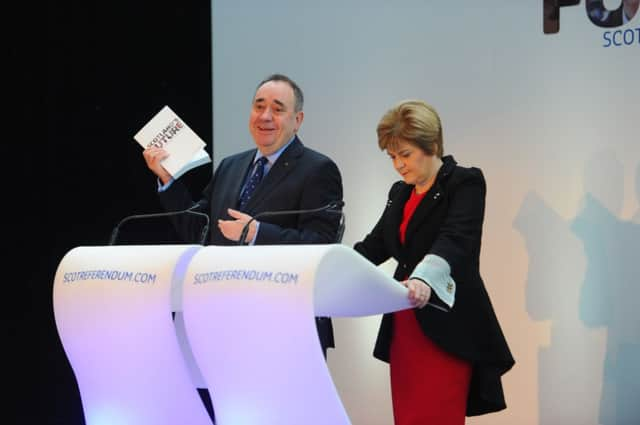Scottish independence: CBI question Yes blueprint


A paper produced by the Confederation of British Industry (CBI) claimed Mr Salmond’s white paper for independence does “not add up”, even when North Sea oil and gas revenues are taken into account.
According to the CBI, the white paper offers no credible plan for deficit reduction – even though Scotland’s net deficit will be as large, as well as more volatile, than the rest of the UK.
Advertisement
Hide AdAdvertisement
Hide AdIt also claims there is no clarity over what currency the country will use, or its future relationship with the European Union.
The CBI argued that the white paper does not provide a coherent vision for how an independent Scotland would be better off economically by putting up barriers with its biggest export market – the UK. The CBI has said the best way to deliver jobs and prosperity to Scotland is for it to remain part of the UK.
John Cridland, CBI director-general, said: “The minute you draw a line between Gretna and Berwick, Scotland starts to drift apart from its biggest market and loses a significant amount of economic clout.
“The economic plan outlined in the white paper does not add up. It ignores the need for deficit reduction, instead promising more unfunded spending.
“Independence would force Scotland’s major industries to grapple with two lots of red tape and lead to Scots facing higher borrowing costs on loans, mortgages and credit cards. Keeping the pound is the best option for Scotland but that is only on offer through maintaining the union.”
The CBI’s analysis suggested that the Scottish Government’s plans for tax and spend fail to take into account that the squeeze on public services will intensify as the number of over-65s in Scotland grows.
With Scotland’s net deficit larger than the rest of the UK at 8.3 per cent – £2,303 per person – Scotland would need to prioritise deficit reduction, the report said. It also said Scotland’s economy was more volatile than the rest of the UK, given its dependence on oil and gas.
In the event of independence in 2016, Scotland’s fiscal deficit would be 4.8 per cent of Scottish GDP, higher than the 3 per cent maximum allowed by the European Union’s Growth and Stability Pact before members have to consolidate their finances.
Advertisement
Hide AdAdvertisement
Hide AdThe CBI claimed there were at least £670 million unfunded commitments from the white paper, despite the Scottish Government’s statement that its immediate policy plans were fiscally neutral.
On the currency question, the CBI pointed out that Scotland does most of its trade with the rest of the UK – £18 billion more than with any other part of the world. According to the CBI, this strong internal market can only be guaranteed by Scotland remaining part of the UK and keeping the pound.
The CBI’s analysis was disputed by the pro-independence group Business for Scotland.
Tony Banks, chairman of Balhousie Care, Scotland’s largest care provider, and a board member of Business for Scotland, said: “As a member of the CBI, they have never consulted me on my views on independence and I don’t know of any members they have asked. This report represents the personal views of certain office-holders in the CBI.
“I believe businesses in Scotland will benefit from control over decisions made in Scotland rather than Westminster.”
He added: “Scotland is a wealthy country – as even this report is obliged to concede – which has provided a net contribution to UK finances of £8.3bn over the past five years. The plan for deficit reduction is to grow the Scottish economy more quickly when we have the powers of independence.”